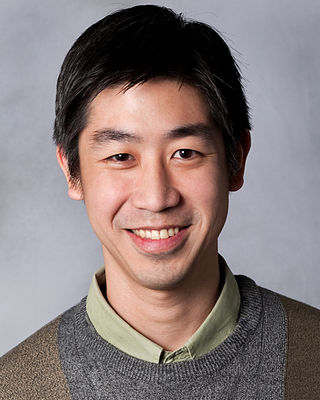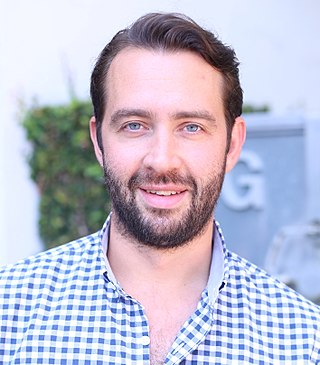Related Research Articles
The University of California, Berkeley College of Engineering is the public engineering school of the University of California, Berkeley. Established in 1931, the college occupies fourteen buildings on the northeast side of the main campus and also operates the 150-acre (61-hectare) Richmond Field Station. It is considered to be highly selective and is consistently ranked among the top engineering schools in both the nation and the world.

The Pratt School of Engineering is located at Duke University in the United States. The school's associated research, education, alumni and service-to-society efforts are collectively known as Duke Engineering.
A brain–computer interface (BCI), sometimes called a brain–machine interface (BMI), is a direct communication link between the brain's electrical activity and an external device, most commonly a computer or robotic limb. BCIs are often directed at researching, mapping, assisting, augmenting, or repairing human cognitive or sensory-motor functions. They are often conceptualized as a human–machine interface that skips the intermediary of moving body parts (hands...), although they also raise the possibility of erasing the distinction between brain and machine. BCI implementations range from non-invasive and partially invasive to invasive, based on how physically close electrodes are to brain tissue.
BrainGate is a brain implant system, currently under development and in clinical trials, designed to help those who have lost control of their limbs, or other bodily functions, such as patients with amyotrophic lateral sclerosis (ALS) or spinal cord injury. The Braingate technology and related Cyberkinetic’s assets are now owned by privately held Braingate, Co. The sensor, which is implanted into the brain, monitors brain activity in the patient and converts the intention of the user into computer commands.
Brain implants, often referred to as neural implants, are technological devices that connect directly to a biological subject's brain – usually placed on the surface of the brain, or attached to the brain's cortex. A common purpose of modern brain implants and the focus of much current research is establishing a biomedical prosthesis circumventing areas in the brain that have become dysfunctional after a stroke or other head injuries. This includes sensory substitution, e.g., in vision. Other brain implants are used in animal experiments simply to record brain activity for scientific reasons. Some brain implants involve creating interfaces between neural systems and computer chips. This work is part of a wider research field called brain–computer interfaces.

Remote control animals are animals that are controlled remotely by humans. Some applications require electrodes to be implanted in the animal's nervous system connected to a receiver which is usually carried on the animal's back. The animals are controlled by the use of radio signals. The electrodes do not move the animal directly, as if controlling a robot; rather, they signal a direction or action desired by the human operator and then stimulate the animal's reward centres if the animal complies. These are sometimes called bio-robots or robo-animals. They can be considered to be cyborgs as they combine electronic devices with an organic life form and hence are sometimes also called cyborg-animals or cyborg-insects.
The School of Engineering and Applied Science (SEAS) at the George Washington University in Washington, D.C. is a technical school which specializes in engineering, technology, communications, and transportation. The school is located on the main campus of the George Washington University and offers both undergraduate and graduate programs.
NeuroSky, Inc. is a manufacturer of brain-computer interface (BCI) technologies for consumer product applications, which was founded in 2004 in Silicon Valley, California. The company adapts electroencephalography (EEG) and electromyography (EMG) technology to fit a consumer market within a number of fields such as entertainment, education, automotive, and health.

Jonathan Marc Rothberg is an American scientist and entrepreneur. He is best known for his contributions to next-generation DNA sequencing. He resides in Miami, Florida.
Bin He is a Chinese American biomedical engineering scientist. He is the Trustee Professor of the Department of Biomedical Engineering, professor by courtesy in the Department of Electrical and Computer Engineering, and Professor of Neuroscience Institute, and was the head of the department of Biomedical Engineering at Carnegie Mellon University. Prior, he was Distinguished McKnight University Professor of Biomedical Engineering and Medtronic-Bakken Endowed Chair for Engineering in Medicine at the University of Minnesota. He previously served as the director of the Institute for Engineering in Medicine and the Center for Neuroengineering at the University of Minnesota. He was the Editor in Chief of the IEEE Transactions on Biomedical Engineering and serves as the editor in chief of IEEE Reviews in Biomedical Engineering. He was the president of the IEEE Engineering in Medicine & Biology Society (EMBS) from 2009 to 2010 and chair of International Academy of Medical and Biological Engineering from 2018 to 2021.

Desney Tan is vice president and managing director of Microsoft Health Futures, a cross-organizational incubation group that serves as Microsoft's Health and Life Science "moonshot factory". He also holds an affiliate faculty appointment in the Department of Computer Science and Engineering at the University of Washington, serves on the Board of Directors for ResMed, is senior advisor and chief technologist for Seattle-based life science incubator IntuitiveX, advises multiple startup companies, and is an active startup and real estate investor.
DexCom, Inc. is a company that develops, manufactures, produces, and distributes continuous glucose monitoring (CGM) systems for diabetes management. It operates internationally with headquarters in San Diego, California, and has manufacturing facilities in Mesa, Arizona and Batu Kawan, Malaysia.

The Center for Neurotechnology (CNT) is an Engineering Research Center funded by the National Science Foundation to create devices to restore the body's capabilities for sensation and movement. The center is based at the University of Washington. The center's core partner organizations are Massachusetts Institute of Technology and San Diego State University.

Verily Life Sciences LLC, also known as Verily, is Alphabet Inc.'s research organization devoted to the study of life sciences. The organization was formerly a division of Google X, until August 10, 2015, when Sergey Brin announced that the organization would become an independent subsidiary of Alphabet Inc. with restructuring completed on October 2, 2015. On December 7, 2015, Google Life Sciences was renamed Verily.
Conor Russomanno is an American entrepreneur, inventor, and public speaker, specializing in the development of advanced human-computer interfaces. He is the co-founder and CEO of OpenBCI, a company dedicated to open source innovation of brain-computer interface technologies. Russomanno has also served as an adjunct professor at Parsons School of Design and NYU Tisch School of the Arts, and as a Research Affiliate at the MIT Media Lab. In 2018, he was honored on the Forbes 30 Under 30 list in the category of Science. In April 2023, Russomanno delivered a TED Talk that featured a spectacular assistive technology BCI and AR demonstration to help a friend living with severe motor disabilities, Christian Bayerlein, fly a drone over the audience.

Christian T. Wentz is an American electrical engineer and entrepreneur. He is recognized for his work in engineering authenticity in electronic devices and the use of these primitives in distributed systems, developing neural interface technologies and innovation in optoelectronics, low power circuit design, wireless power and high bandwidth communication technologies.

Pieter Abbeel is a professor of electrical engineering and computer sciences, Director of the Berkeley Robot Learning Lab, and co-director of the Berkeley AI Research (BAIR) Lab at the University of California, Berkeley. He is also the co-founder of covariant.ai, a venture-funded start-up that aims to teach robots new, complex skills, and co-founder of Gradescope, an online grading system that has been implemented in over 500 universities nationwide. He is best known for his cutting-edge research in robotics and machine learning, particularly in deep reinforcement learning. In 2021, he joined AIX Ventures as an Investment Partner. AIX Ventures is a venture capital fund that invests in artificial intelligence startups.

Jan M. Rabaey is an academic and engineer who is professor emeritus and Professor in the Graduate School in the Electrical Engineering and Computer Sciences at the University of California, Berkeley. He also serves as the CTO of the Systems Technology Co-Optimization division at imec, Belgium.
Neural dust is a hypothetical class of nanometer-sized devices operated as wirelessly powered nerve sensors; it is a type of brain–computer interface. The sensors may be used to study, monitor, or control the nerves and muscles and to remotely monitor neural activity. In practice, a medical treatment could introduce thousands of neural dust devices into human brains. The term is derived from "smart dust", as the sensors used as neural dust may also be defined by this concept.
Joyce Poon is Professor of Electrical and Computer Engineering at the University of Toronto and Director of the Max Planck Institute of Microstructure Physics, where her research focuses on developing new optical devices for applications in neurotechnology. She is also an honorary professor at the Technische Universität Berlin. She is a Fellow of Optica, and has been serving as a Director-At-Large for the society since January 2021.
References
- ↑ Slawski, Bill (March 14, 2016). "Google Assigns 148 Medical Patents to Verily Life Sciences". SEO by the Sea ⚓.
- ↑ Franchino, Dave (September 29, 2019). "Reflections on Delve Talks, Part 2: Building a Culture of Innovation". www.Delve.com.
- ↑ "Dexcom and Verily Amend Collaboration and License Agreement". investors.dexcom.com.
- ↑ "Dexcom G7 Launches in the United Kingdom, Ireland, Germany, Austria and Hong Kong – Initiating Global Rollout of World's Most Powerful Continuous Glucose Monitoring System". investors.dexcom.com.
- ↑ "FRO Portfolio". Convergent Research.
- ↑ "Mass Device Butterfly Partnership". Mass Device.
- ↑ "Forest Neurotech and Butterfly Partnership Announcement". Butterfly Network.
- ↑ "New Neurotech Eschews Electricity for Ultrasound". IEEE Spectrum.
- ↑ "Two graduate students win NDSEG Fellowships | UW Department of Electrical & Computer Engineering".
- ↑ "BWRC Website with Jan Rabaey's Alumni List".
- ↑ "Membership | Berkeley Wireless Research Center". bwrc.eecs.berkeley.edu.